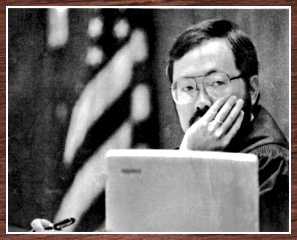
LANCE
ITO
Los Angeles
Superior Court Judge
Thursday, September 18, 2003
Page 15
REMINISCING (Column)
Lance Ito Becomes TV’s Most-Watched Judge
By ROGER M. GRACE
Joseph A. Wapner was the most famous judge in the world.
…Until that distinction shifted to another in 1995.
The “Case of the Century,” People v. Simpson, was assigned to Los Angeles Superior Court Judge Lance Ito. To his credit, he allowed the public to watch, via television.
He had done the same in 1992 at the securities fraud trial of Charles Keating. There was public interest in the “junk bond” case; portions of the trial were televised; no criticism emerged of the decision to allow cameras.
But the O.J. Simpson case was different. There was unprecedented public curiosity, unbounded analysis, and controversy at every turn.
|
|
LANCE
ITO |
|
Through no desire or design on his part, Ito became an international celebrity. He was the star of the most popular courtroom show in the history of television.
Live from Department 103 of the Criminal Courts Building, the show brought high ratings to CNN, E!, and Court TV. It siphoned 10 percent of the viewers from daytime soap operas, and in the east, where it was on at the same time as network news shows, seized 18 percent of the viewership from the NBC Nightly News and lured 15 percent of the CBS News devotees.
It was broadcast locally on KTLA, Channel 5. In its July 12, 1995 issue, the Los Angeles Times reported that two days earlier, that station had brought the trial to 489,000 homes in the area.
An estimated 51 million people were viewing the day the jury came in with the verdict.
Ito was among those attending the 1997 MetNews “Person of the Year” dinner. He bought an item at the silent auction for something like $75. I suggested to the charity that was benefiting from the auction that it might not want to cash the check; it was probably worth more than the face amount as a collector’s item.
Indeed, there was Itomania. The nameplate was stolen from his courtroom door. Trash cans at his home were raided by souvenir hunters.
Ito was satirized and lampooned. Jay Leno, on the “Tonight Show,” presented the Dancing Itos, a troupe of Asian men in black robes. There was wide speculation that Ito would run for Congress or some other political office.
No judge in history has had his decisions subjected to the level of Monday morning quarterbacking that Ito did, and probably none had the loss of privacy that he incurred.
The presiding judge when the trial took place was R. Gary Klausner, now a member of the U.S. District Court for the Central District of California. While some have viewed Ito as one who relished his celebrity status, Klausner saw it differently.
“I think he was not happy with the fact that he could not go anywhere without being recognized,” Klausner said. “I think he did not enjoy losing his privacy.”
While Ito did grant the request for electronic coverage, Klausner observed: “I think he would have been more comfortable without the cameras in the courtroom, knowing him.”
He related his impression that Ito, in “evaluating all the circumstances,” felt “he had a responsibility to have [the trial] open.” One of those circumstances, Klausner specified, was that there had been the admission of cameras by then-Los Angeles Municipal Court Judge Kathleen Kennedy-Powell at the preliminary hearing, without negative feedback.
Robert M. Mallano, now a justice of this district’s Court of Appeal, was presiding judge of the Superior Court when Ito was chosen. He said he received a phone call from Cecil Mills, who was supervising judge of the Criminal Department (now retired), who bounced off of him his intent to assign the case to Ito.
“I said ‘fine,’” he recounted. “I thought that was a good choice.”
Mallano said of Ito:
“He never was a publicity hound. He didn’t ask for the case—it got sent to him, and he took it.”
There were judges who were jealous of him. Some were miffed that he would admit cameras; the prospect of that becoming a trend was unsettling to those who wouldn’t want the public to be watching them.
And there were critics, judges and lawyers among them, who insisted that Ito was a ringmaster at what he allowed to become a “media circus.”
Both Klausner and Mallano suggest that negative feelings toward Ito may relate to the displeasure many felt over the verdict.
“You gotta blame someone,” Klausner remarked.
Mallano made his point by quoting the Roman philosopher Publius Syrus as saying, 2,000 years ago:
“The judge is condemned when the criminal is absolved.”
Next week, more about the controversy over Ito’s handling of the case.
Copyright 2003, Metropolitan News Company